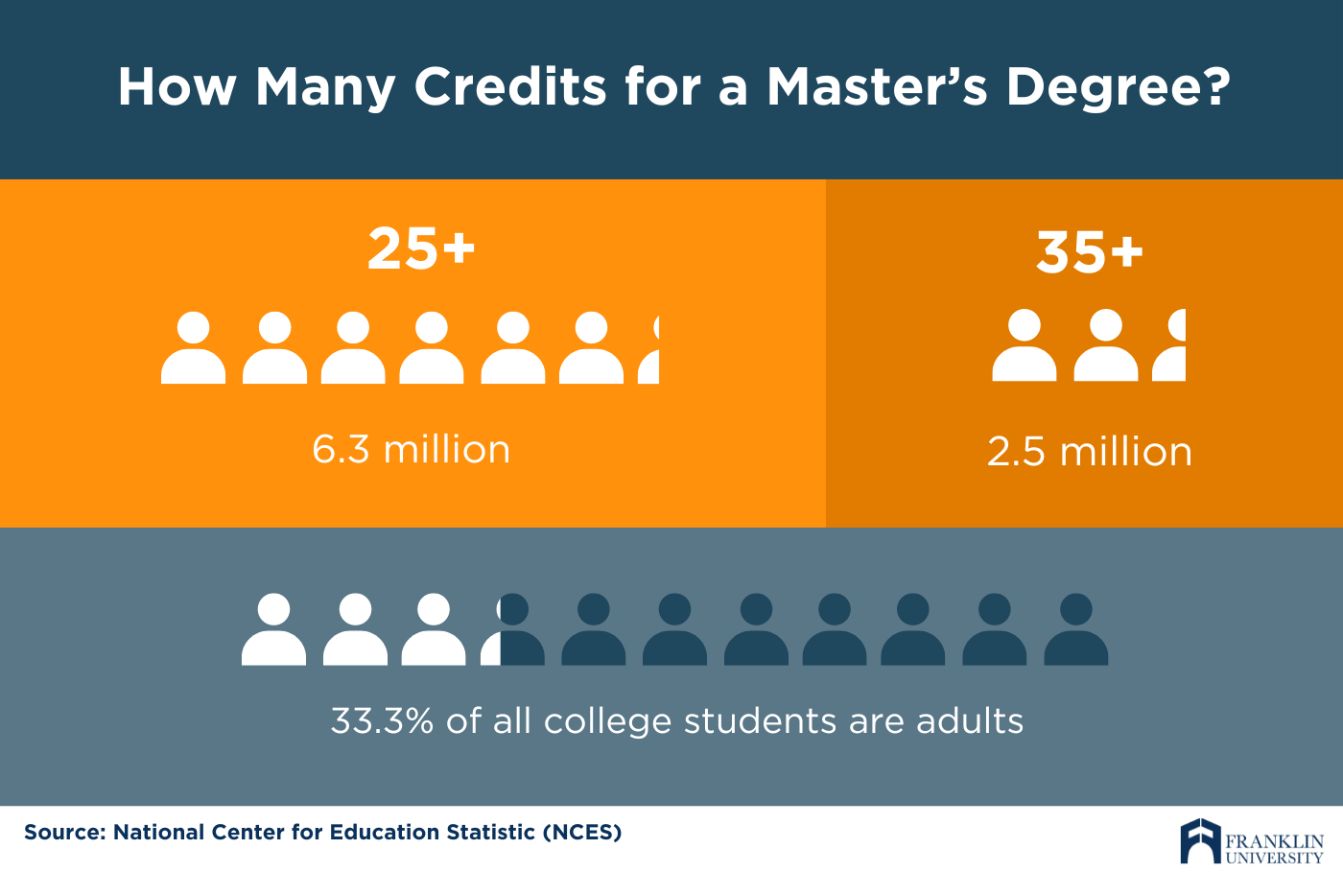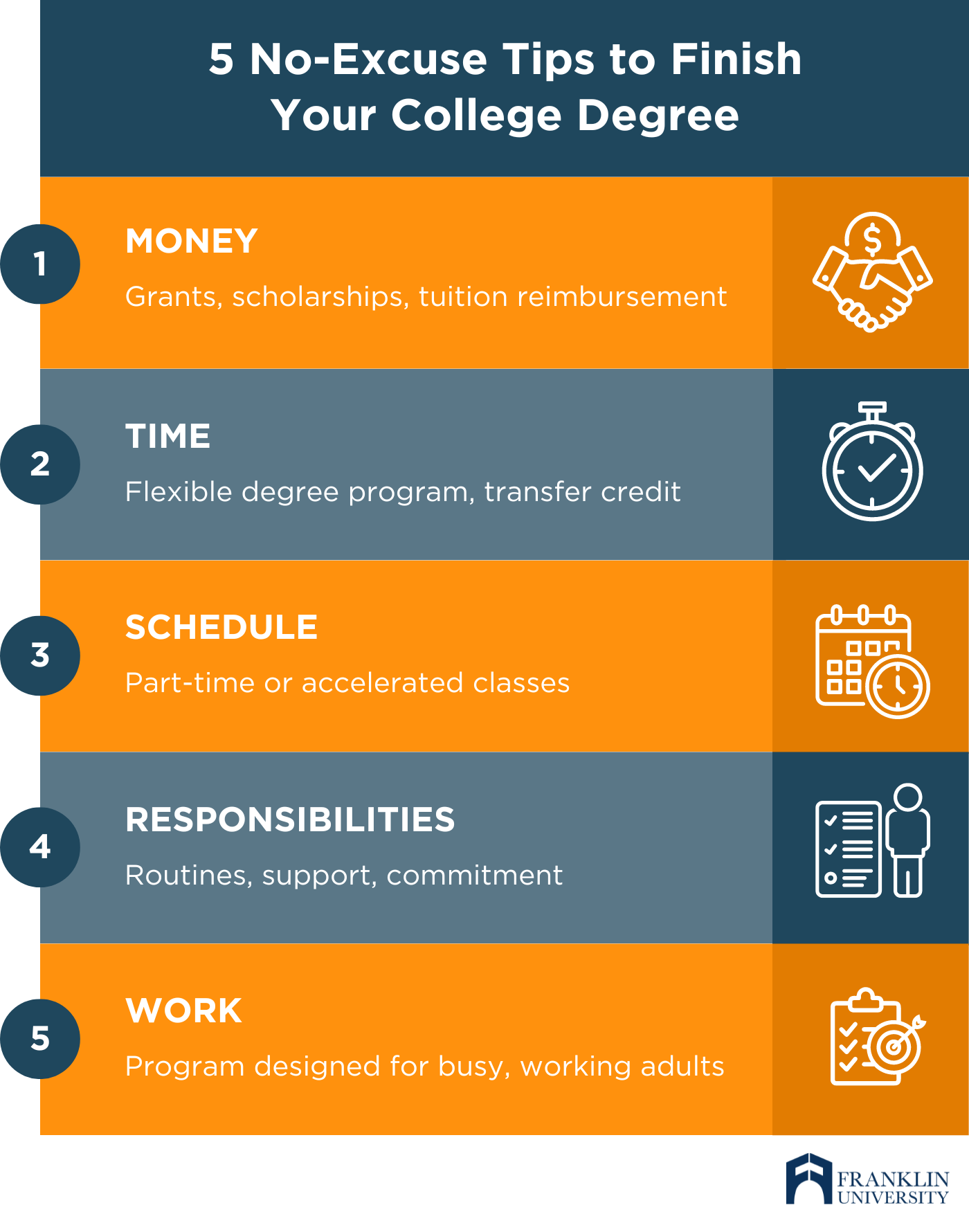Request Information
We're Sorry
There was an unexpected error with the form (your web browser was unable to retrieve some required data from our servers). This kind of error may occur if you have temporarily lost your internet connection. If you're able to verify that your internet connection is stable and the error persists, the Franklin University Help Desk is available to assist you at helpdesk@franklin.edu, 614.947.6682 (local), or 1.866.435.7006 (toll free).
Just a moment while we process your submission.

5 Excuses That Stop Adults From Finishing Their Degree [and How to Overcome Them]
If you’re thinking about going back to school as a busy, working professional, you know that college isn’t the same for adults as it is for more traditional students.
That can be a good thing, of course. But it also can bring a host of challenges that you as an adult student have to deal with.
Fortunately, you’re not the only adult looking to finish your degree. According to the National Center for Education Statistics (NCES), in 2021 there were 6.3 million college students over the age of 25. Of those adult students, 2.5 million were aged 35+.
So, what does that mean? It means that one-third of all college students were adults.

Why You Should Go Back to College as an Adult
Maybe you went to college but life got in the way and you didn’t finish. So, if you’ve been thinking of going back because you want to finish what you’ve started, make yourself more promotable, or expand your career options, going back to school as an adult makes sense.
But for every adult who heads back to college, another decides against it.
Why? Well, there are some valid reasons and some not-so-valid reasons. Here’s a look at five of the biggest obstacles to finishing your degree along with some tips to overcome them.
Adult Learners: 5 Obstacles Between You and Your Degree

1. It’s expensive. How can I pay for it?
Few people can afford the full cost of an education without a little help. So, when it comes to paying for college it can help to know your options.
Kick start your research by asking your employer if they're willing to help cover some of the costs. Tuition reimbursement benefits and scholarships are out there, so you might be surprised at how many doors can be opened just by talking to your employer.
Next, talk with a tax professional or the Internal Revenue Service (IRS) to see if you qualify for any tax breaks, such as the Lifetime Learning Credit.
Don’t forget about scholarships and grants, some of which are available through your school. For example, Franklin University has $13 million in tuition assistance available for eligible students. Talk to an academic advisor to find out what’s available and search an reputable online source, such as FastWeb.com.
Finally, make sure to complete the Free Application for Federal Student Aid (FAFSA®) to see what type of federal or state financial aid, grants or loans you may be eligible for. Remember, completing the FAFSA does not mean you’re agreeing to take out loans; it’s just used to determine eligibility for tuition assistance.
2. I just don’t have enough time for school.
Adding classes, assignments and studying on top of everything you already have going on in your life can be a challenge. But, it’s a challenge that offers a worthwhile reward
If you think you don’t have time to earn your degree, consider a flexible school that offers options, including a staff that understands the specific scheduling needs of busy adults.
Also, look into transfer credit options. Many adult learners are surprised to find that they have eligible credits that let them complete a degree faster.
3. I can’t attend class full time.
No problem. You have options, including attending part time or taking accelerated classes. Accelerated classes are uniquely designed for the time challenged.
But don’t rule out full-time attendance. Instead, rethink it. There are programs that let you stagger your schedule so you can focus on one or two shorter courses while still completing a full-time load each term.
4. I have family responsibilities.
Of course, family is the number one priority. But you can create a schedule for yourself that lets you succeed at home and in the classroom. Ask your school’s student advisors for help. Many were adult learners themselves and know how to create a schedule that works.
Sure, balancing a family, work, and school responsibilities takes a little practice, but others have done and so can you. So, get organized, find a routine that works, and stick to it.
5. I have a job. How am I supposed to attend classes?
Find a degree program that lets you fit your classes around your work life and, again, talk to your advisors about ideas and solutions they may have.
Online classes are a great option for busy, working adults because they give you the freedom to decide when to study. Most institutions geared toward adult learners offer classes in the evenings, on the weekend and online so the work day isn’t compromised.
Finally, ask your instructor for the syllabus before the term begins so you can make a plan to accommodate work commitments and your coursework
No More Excuses
When it comes to excuses, obstacles, or whatever you want to call them, thinking things through then coming up with an action plan is a powerful thing.
Fortunately, no matter what’s kept you from finishing your degree, there’s always a way to overcome it.
So now that you have a better understanding of what’s been holding you back, use these tips to do what you’ve always wanted: Finish your college degree.





